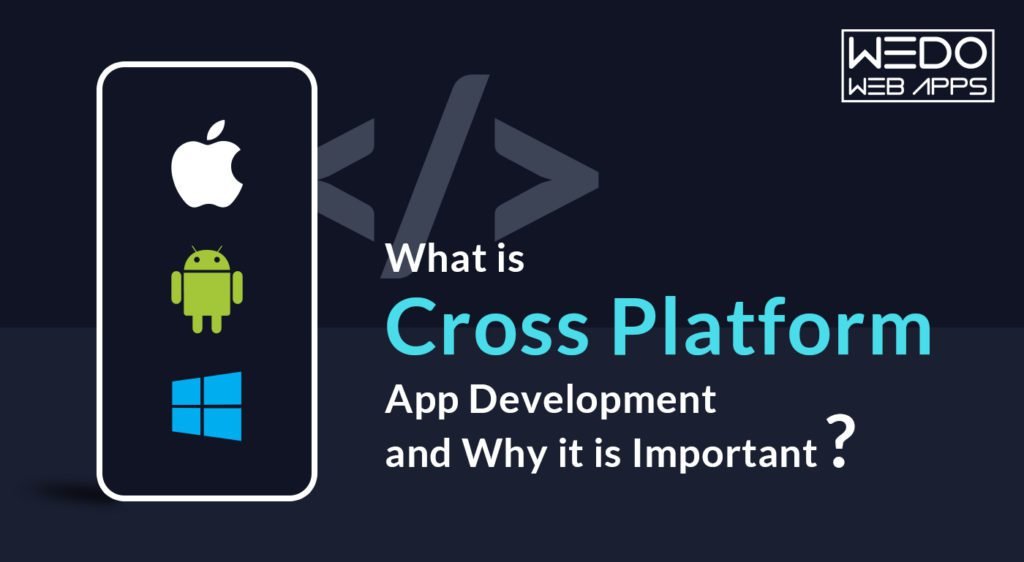15 Dec, 2022 | cross platforms app development company
What Is Cross-Platform App Development, and Why Is It Important?

- What is the cross platform app? And top 3 examples of cross platform apps.
- What are its benefits over native applications like Android or iOS?
- How does it compare with other app development methods like a hybrid, PWA, native, etc.?
What is cross-platform mobile App Development?
Cross-platform app development is an approach that most of Cross Platform App Development company uses technologies to aid in the creation of apps for both the iOS and Android platforms at the same time. Building a high-end application using only one type of technology (such as iOS or Android) isn't enough to create applications that require entering multiple data types. But why would businesses want to run one app on several platforms? Here’s why:| Benefits | |
| Speed | Cross platforms provide features such as reusable code, plugins, and UI components, which speed up the development time and thus make it easy to launch the app faster! |
| Convenience | You don’t need to hire two separate developers teams for Android and iOS. And thus, it reduces the frustration of managing two sets of teams. |
| Reach | Since cross platforms support any operating system and device; it has a much broader reach than native apps. |
| Cost | The majority of businesses aim to reduce risk as much as possible by earning a single dollar from an app before release. Businesses can lower risk by developing cross platform apps, since creating an MVP and releasing it is easier. |
| Maintenance | As said above, you only have one codebase to maintain, which means easy bug fixes and faster upgrades. |
| Uniformity | The majority of businesses with multiple apps find it challenging to maintain uniformity in user experience. cross-platform apps do not have such issues, as one app runs on all devices and platforms. |
Top Three Examples Of Cross-Platform Apps Going Strong
#1. Google Ads with Flutter
 Google Ads App Google Ads is one of the most popular cross-platform mobile apps created with Flutter. This mobile app allows you to create and manage Google Ads directly from your smartphone. Essentially, it is similar to the desktop application, except users can track ad output anywhere – which means no need to be in front of a desktop or laptop to track ads. Users can view campaign statistics, update bids and budgets in real-time, get live alerts, edit keywords, and get in touch with Google experts.
Google Ads App Google Ads is one of the most popular cross-platform mobile apps created with Flutter. This mobile app allows you to create and manage Google Ads directly from your smartphone. Essentially, it is similar to the desktop application, except users can track ad output anywhere – which means no need to be in front of a desktop or laptop to track ads. Users can view campaign statistics, update bids and budgets in real-time, get live alerts, edit keywords, and get in touch with Google experts. #2. Instagram with React Native
 Instagram Mobile App Instagram is one of the hottest social media sites today, with over a billion users worldwide. However, before going cross-platform, Instagram was a native app. But seeing the benefits of React Native, the app makers slowly shifted each function, like push notifications and profiles, to React Native to see whether it made any difference. To their surprise, Instagram fared well on React Native, and today it used hire dedicated React Native developers as its framework. How did Instagram benefit from shifting to cross-platform:
Instagram Mobile App Instagram is one of the hottest social media sites today, with over a billion users worldwide. However, before going cross-platform, Instagram was a native app. But seeing the benefits of React Native, the app makers slowly shifted each function, like push notifications and profiles, to React Native to see whether it made any difference. To their surprise, Instagram fared well on React Native, and today it used hire dedicated React Native developers as its framework. How did Instagram benefit from shifting to cross-platform: - Both Android and iOS platforms benefited greatly from React Native's ease of maintenance.
- Faster performance due to lightweight interface.
- Quick new feature shipping of React Native helped it gain an edge over other social media platforms.
Best Cross Platform Framework Technologies To Develop Your App
Below are the top preferred frameworks that most Cross Platform App Development companies use.#1. React Native
Facebook (now Metaverse) created React Native, an open-source UI software platform, in 2015 (a little sooner than Flutter). It is based on the JavaScript React from Facebook and allows developers to create natively rendered cross-platform mobile apps. Skype, Bloomberg, Shopify, and many tiny modules of Facebook and Instagram all have mobile apps. Why is React Native a top cross-platform app development framework?- With Fast Refresh functionality, developers may view their changes in their React components immediately.
- One of React Native's benefits is its emphasis on the user interface. React primitives are rendered to native platform UI components, allowing you to create a unique and responsive user experience.
- As one of the most popular cross platform app development frameworks, React Native has a huge and active developer community that shares technical information.
#2. Flutter
It was released by Google in 2017 and is a popular framework for developing mobile, web, and desktop apps from a single codebase. To create applications using Flutter, you'll need to utilize Dart, a programming language developed by Google. Example apps for mobile: eBay, Alibaba, Google Pay, and ByteDance. What So Unique About Flutter?- The hot reload functionality in Flutter lets you see how your application changes as soon as you alter the code without having to recompile it.
- Flutter is compatible with Google's Material Design, a design system that assists developers in creating digital experiences. When developing your app, you may use a variety of visual and behavioral widgets.
- It is not dependent on web browser technologies and instead uses its own rendering engine to draw widgets.
- Flutter has a relatively active user community all around the world. Many developers make extensive use of it.
#3. IONIC
Ionic is a 2013 open-source user interface toolkit. It enables developers to create hybrid mobile and desktop apps by combining native and web technologies such as HTML, CSS, and JavaScript, as well as integrations for the Angular, React, and Vue frameworks. T-Mobile, BBC (Children's and Education applications), and EA Games provide mobile apps. What Is So Unique About IONIC?- The Ionic framework makes use of the Cordova and Capacitor plugins to provide users access to built-in smartphone functions such as the camera, flashlight, GPS, and voice recorder.
- Ionic features its own integrated development environment (IDE) called Ionic Studio, which was created for developing and prototyping apps with minimum code.
- The Ionic Forum is buzzing with activity as community members share information and assist one another in overcoming development obstacles.
How Does cross-platform App Development Compare With Native, Hybrid, and PWA development?
| Differences | cross platform App Development | Native App Development | Hybrid App Development | PWA App Development |
| Cost | Cross Platform apps are cost-effective | Native app development is Costly | Hybrid apps are cost-effective | PWA is low-cost applications |
| Development Time | Time-savor due to code reusability | Time-consuming as the need to develop separate apps | Time-savor due to code reusability | Take less development time |
| Multi-platform availability | Cross Platform supports | Need to create separate apps for multiple platforms | One code Works on several platforms | One version works on multiple platforms. |
| Offline Functionality | cross platform supports offline functionality | Native apps support offline functionality | Hybrid apps can work offline | Limited only to the data cached while the device is connected to the network |
Conclusion
We hope that the above article provided you with all the answers that you had regarding cross-platform mobile applications and their development. You significantly limit your potential user base when you develop for only one platform. That’s where cross-platform apps fill the gap. As you can see, the most appealing aspect of the cross-platform app is its ability to work on multiple operating systems with a single codebase! However, it's also important to hire the right Cross Platform App Development Services to ensure wide reach. So, are you ready to develop your own cross-platform mobile app? WeDoWebapps can help you. We are a US-based mobile app development company with a record of creating chart-topping cross-platform apps. We have built apps for clients in multiple industry verticals such as SaaS, medical, education, etc. Contact us today. FAQs- What is the difference between native app development and cross platform app development?
- How does hybrid development differ from cross platform development?
- How are cross platform apps different from native apps?
Frequently Asked Questions
Cross-platform app development is important because it allows businesses to reach a wider audience with their mobile applications, reduces development time and costs, and allows for easier maintenance and updates across different platforms.
Some common cross-platform app development frameworks include React Native, Xamarin, Flutter, and Ionic.
Cross-platform app development differs from native app development in that it uses a single codebase that can be used across multiple platforms, while native app development requires separate codebases for each platform.
Some benefits of using cross-platform app development include faster development time and reduced costs, improved maintenance and updates, and the ability to reach a wider audience with a single codebase.
A business can choose the right cross-platform app development framework for their needs by evaluating factors such as development speed and costs, platform compatibility, and access to platform-specific features and functionalities.

